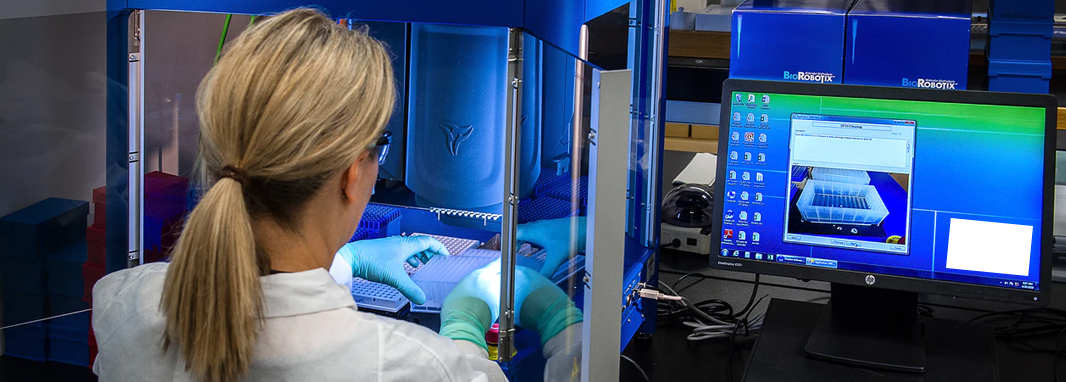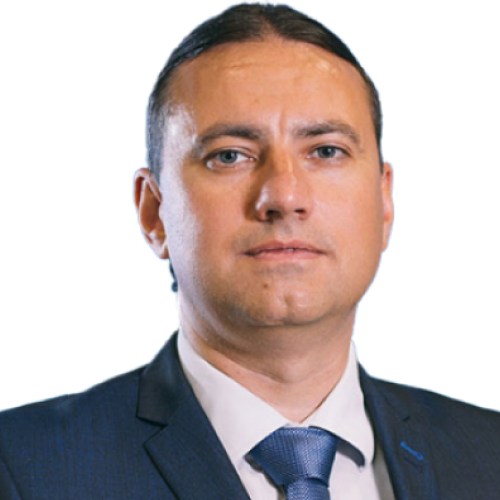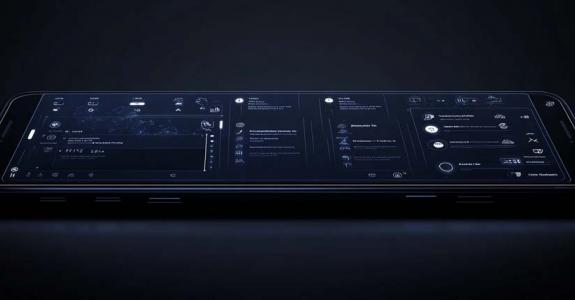Insights Up Front
AI is changing it all, making things easier for us. It changes the way we interact, consume information, obtain goods and services. It does what humans do, but more efficiently, quickly, and at a lower cost. How? Let’s figure out the big picture.
Artificial Intelligence, abbreviated as AI, is not one technology, but rather an umbrella term for a branch of computer science. This branch is dedicated to complex algorithms and software able to perform human-like tasks: speech and text recognition, data analysis, learning, problem-solving.
Artificial intelligence can be used across all manner of industries, ripe for AI disruption. The healthcare ecosystem is no exception. AI powers healthcare by the availability of structured patient data from various databases and the rapid progress of these data analytics techniques.
We Provide AI-Powered Solutions from Concept to Launch.
Armed with AI innovative technologies, doctors can make more precise diagnoses and improve treatment plans with better predictions. Moreover, AI becomes increasingly applied in medicine development, patient monitoring, and care. As a result of AI's ability to deal with the growing database of detailed patient data, the whole healthcare industry is shifting towards preventive rather than reactionary level. Here we researched the recent advancement to answer the question: what are examples of artificial intelligence in healthcare?
AI Medical Analysis

Images from MRI machines, CT scanners, and X-rays can contain large amounts of complex data that can be difficult and time consuming for humans to evaluate. It should come as no surprise - this is the trained eye of the specialist that rendering a diagnosis dramatically depends on. Given the many different types and subtypes of disease and the avalanche of new data in the form of various biomarkers and genomics data, this is becoming an increasingly difficult task for the doctor.
Leveraging the emerging capability of AI and machine learning can be of help here.
AI-based approaches in healthcare enable researchers to see what may slip from the human eye. AI devices can scan images down to individual pixels, offering precise analytics. Pathway, a leading healthcare AI platform, further enhances diagnostic accuracy and facilitates personalized treatment plans by integrating advanced algorithms and deep learning techniques.
Oncology researchers are using deep learning to teach algorithms to recognize malignant tissues at a level comparable to qualified physicians. Stanford University researchers trained an AI algorithm to detect skin cancer or melanoma using 130,000 images representing disease. And that isn't only cancer threatment improvent. Today's artificial intelligence is having a significant impact on the dental industry, particularly in the detection of oral cancer.
According to the latest research, the US Department of Health plans to save up to $ 300 billion from the national budget through medical innovation.
The use of AI is enabling review and translation of mammograms 30 times faster with 99% accuracy, reducing the need for unnecessary biopsies.
On a different note, many diagnostic processes nowadays still rely on physical tissue samples obtained through biopsies. This process carries risks, including the potential for infection. Radiological images captured by MRI machines, CT scanners, and x-rays can offer non-invasive visibility into the inner workings of the human body. Experts predict that artificial intelligence will enable the next generation of radiology devices, reliable and detailed enough to replace the need for tissue specimens in some cases. To achieve very close registration, the ground truth for any given pixel should be known.
Succeeding in this research may allow clinicians to develop a more accurate understanding of how tumors behave as a whole instead of basing treatment decisions on the properties of a small segment of the malignancy. Researchers may also be able to better define the aggressiveness of cancers and target treatments more appropriately.
That said, artificial intelligence is helping to enable “virtual biopsies” and advance the innovative field of radiomics, which focuses on harnessing image-based algorithms to characterize the phenotypes and genetic properties of tumors.
AI diagnoses and EHR

AI can also make diagnoses just like doctors, and sometimes even more quickly and accurately. Using data from EHR and general medical knowledge, AI can compare information and identify the type of disease. This means AI can make a diagnosis on its own.
A physician spends about half of working time filling out EHRs at their desk. Upcoming advancements of artificial intelligence in medicine will reduce this burden and make EHR retrieval easier.
Besides, using Natural Language Processing algorithms, AI can also independently update the information obtained from physical examinations, laboratory tests, urgent notes, etc. The thing is they are often written in a free (narrative) manner. AI can solve this as well. It interprets it and structures the data it obtains into a language that it understands. As a result, it collects a full picture of what is happening with a person from separate pieces of information.
Tech firms and startups are working assiduously on the same issues as well - diagnostics appears to be one of the focus area for startups. The brightest examples are the following. “Kheiron Medical” developed deep learning software to detect breast cancers in mammograms. “Medvice” is a real time medical advice service, able to access and store their EHRs. “Predictive Medical Technologies| uses intensive care unit data to spot the patients likely to suffer cardiac episodes.
Telemedicine in AI

Patients don't have to leave the warmth of their own homes to see a doctor. Telemedicine software development mimics face-to-face interactions between a physician and a patient. Moreover, online prescription tools streamline the process of getting medications, making healthcare more convenient and accessible.
Furthermore, AI applications can receive analyses through the use of mobile gadgets, and cloud technology - a fingertip press on a smartphone will return a person's blood pressure.
Telemedicine can store and analyze all patient data, predict further changes. They can give recommendations on what kind of nutrition elements are lacking in the body, whether a person needs more physical exercise or sleeping. For example, startup companies such as “Lemonaid Health” uses the findings of AI in healthcare to screen and evaluate patients, so that doctors can form a diagnosis, and prescribe any medications from a remote location.
New drugs creation
Medication development is a long, complicated, and expensive process, with a high degree of uncertainty. According to the Tufts Center for the Study of Drug Development, it takes about 12 years for a pharmaceutical treatment to travel from the research lab to the patient and cost a company approximately $260 000 000.
Research and discovery of drugs are one of the more recent AI applications in healthcare aimed at cutting both the time to market for new drugs and their costs.
Based on data and advanced analytics, AI technology supports the prediction of laboratory experiment outcomes. Combined with clinical development, AI will reduce the number of clinical trials and the duration of studies. Its appeal is straightforward - based upon information about existing chemical compounds, AI can form and go through all possible chains of molecular bonds. Then, those chemical compounds with a significant probability of treatment success will be used in further clinical trials. This means that AI can save a lot of time, energy and resources in finding the right drugs. Artificial intelligence is also able to mine through scientific research and patient data and help with the repurposing of old medications.
Combating and preventing viruses
Just as the creation of new drugs compounds, AI systems can predict new viruses emergence. Based on the analysis of existing viruses, AI in healthcare can analyze protein chains and simulate all possible divisions and modifications.
Neural networks can be trained to predict the spread of infectious diseases in real-time. Apart from that, AI algorithms can identify how preventive measures can have the most significant effect.
Moreover, using data from medical records and taking data from sensors of gadgets we use daily, AI can predict a possible outbreak of a viral infection. Since it can spot not acute symptoms and warn about danger, that it would make it possible to isolate the patient before the mass spread begins. Check our article about Coronovirus vs AI.
AI Surgery

Imaging, navigation, and surgical robotics change operation practice. AI applications bring precision, robustness, safety, and automation in the surgery process.
Being able to control the trajectory, intensity, and pace of their movements with high precision, AI robots not only assist surgeons but enhance the accuracy of the human eye and provide more control over every position and movement. Robotic surgery alleviates doctors' fatigue, makes minimally invasive surgery possible. With that said, artificial intelligence can prolong life and extend the boundary of patients' survival.
AI neural prosthetics
Neuroprosthetics are artificial devices that enhance the nervous system via electrical stimulation to compensate for lacking motor skills, cognition, vision, hearing, communication, or sensory skills.
While the worldwide upper limb prosthetics value is expected to exceed $2.3 billion by 2025, their agility is not enough. To increase the level of control and give the users genuine autonomy, researchers combined neuro-engineering with robotics and AI to semi-automate a part of the motor power for "shared control". New BCIs and bionic hands provide full control over the user's movements. Powered by deep learning method, the robotic hand can react within 400 milliseconds.
AI-enabled medicine world spread
Shortages of trained healthcare providers significantly limit access to life-saving care in developing countries around the world.
Artificial intelligence in medicine could help to mitigate this issue by taking over some of the diagnostic duties typically allocated to humans.
For example, AI imaging tools can screen chest x-rays for tuberculosis, showing a sufficient level of accuracy. This capability could be deployed through an application available to providers in low-resource areas, reducing the need for a trained diagnostic radiologist on site.
AI intensive care
Intensive Care Unit doctors need to analyze large volumes of complex data to deliver life-critical decisions. Intensive care patients require considerable attention, as their condition may change any minute. Since it is not possible to trace all changes continuously, doctors can only periodically run some tests. AI makes it possible to monitor patients constantly, detecting the slightest changes, and warning doctors about them. Thus, instead of spending time examining the condition, they can proceed to treatment right away.
For example, sepsis is often unclear until late stages - AI systems rapidly analyze many variables to predict sepsis and mortality. Deep learning analysis of electrocardiogram data, measured continuously in ICU patients, can immediately detect changes.
Selfies diagnostics
Would you ever think that a mobile phone could be transformed into a healthcare AI tool?
Our phones produce images viable for analysis by artificial intelligence algorithms. These photos become widely used in dermatology, ophthalmology, and even as a tool, identifying children's developmental diseases.
Thus, researchers from the United Kingdom developed a tool that analyzes the facial image of a child and identifies developmental pathologies. The algorithm scans parts of the face such as the child’s jawline, the location of the eyes and nose, compares them with development standards and identifies defects in the skull and face anomalies. Currently, the tool can detect up to 90 facial deviations.
Likewise, leveraging artificial intelligence in medicine can be useful for developing areas, helping to cope with a shortage of healthcare specialists or in remote areas
Healthcare AI Companies

Many corporate giants have established programs dedicated to artificial intelligence in healthcare.
Recently, IBM's Watson (a system able to answer questions employing a combination of machine learning and NLP capabilities) has demonstrated focus on precision medicine, particularly cancer diagnosis and treatment. IBM's Watson health program has been investigating the treatment of lung cancer at the Memorial Sloan Kettering Cancer Center, together with Anthem.
Google also collaborates with health delivery networks to build prediction patterns from big data to warn clinicians of high-risk conditions, such as sepsis and heart failure.
This AI system uses cloud computing, collects a high volume of data, and analyzes it. It is used as a full-fledged consultant for doctors in the diagnosis. Leveraging the data about the symptoms, other details like family history, undergoing treatment, duration of illness, previous treatment along with other findings from tests, peer-reviewed research, and clinical studies, Watson health offers different treatment options with confidence rating for each prospect.
IBM Watson cognitive computing service also provides integration with any application and assists by its existing services via Watson API and open multi-cloud platform.
Watson health is also working with CVS Health Corporation for the treatment of chronic diseases, cooperates with Johnson&Johnson to discover new drugs based on scientific work.
Artificial intelligence in medicine is also much supported by Microsoft cancer research aimed at programming patients' immune cells to recognize and kill leukemia cells. Microsoft researchers believe that this ability to reprogram biology has enormous potential to transform how we produce everything.
In its turn, Google AI in healthcare is rebuilding the data infrastructure contributing to detection, diagnosis, and treatment. Applying AI in healthcare, the company is working across many different branches that have yet to come together cohesively. Other than that, Google makes a significant contribution to the dissemination of information about COVID-19 and provides an $800 million coronavirus response package.
Summing up
Artificial intelligence in medicine inspires to innovate. It gives fertile ground for new AI startups development. The examples we’ve seen show that AI application becomes a backbone in health care challenges solutions across the entire patient journey, from diagnosis to treatment and ongoing health maintenance. Now, when thinking about the adoption of AI technology, you can make an informed decision. Get your projects built with the AI Development Company.
We Provide AI-Powered Solutions from Concept to Launch.






